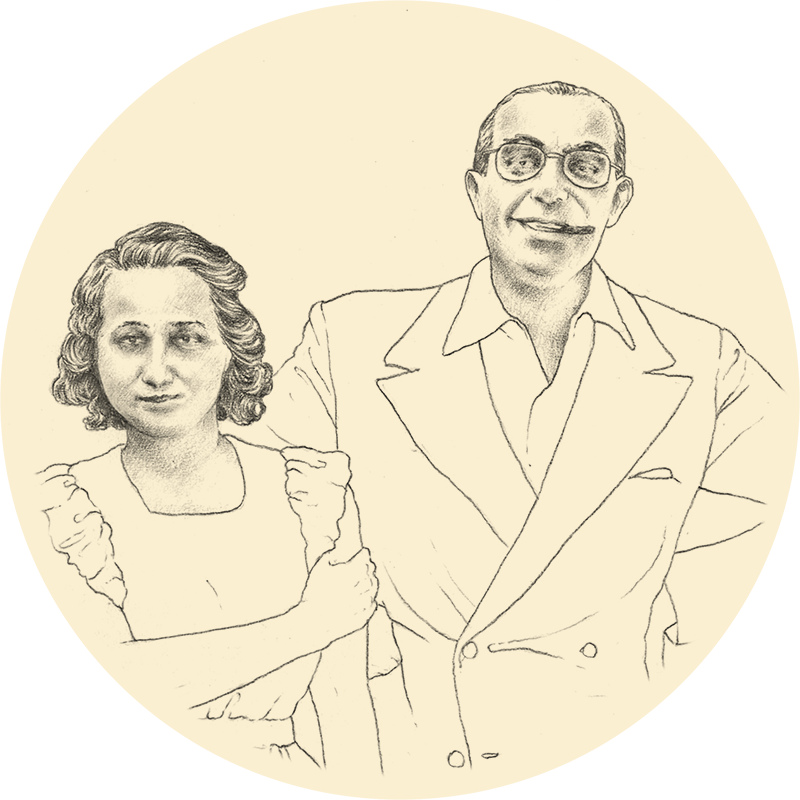It was a challenge, a lovely, poetic challenge. To imagine a suburban villa in the heart of the city, in the nucleus of the metropolis in nuce, right in front of the luxurious Via Mozart where daring buildings had sprung up. To distinguish yourselves in this “distinguished” neighborhood of Milan. Perhaps to bring a swath of the Pavia countryside, Arcadian, nostalgic, into this new urban zone. To avoid completely severing ties with your roots. So your house was born. Trying to be Milanese, even in the sense of rigor. No worldly socializing, beyond what was obligatory to your position. Only a few selected friends for dinner, a stroll in the center to go shopping. Those were luxurious outings, Gigina, along with your sister: flowers from Fumagalli, jewelry from Spoggi or Colombo on Montenapoleone. And the dresses! You two were always very elegant, with your hats, gloves, scarves, all carefully coordinated, purchased in Paris, Monte Carlo or Milan; shoes made to measure by D’Agata, Ronchi, Rivolta. Or acquired from Ferragamo or Capucine.

You had important friends, aristocrats, maybe to compensate for the airs and graces you were lacking, trying to be more royalist than the King himself. Or perhaps trying to make that fairytale world come true, the one pursued since childhood by you two sisters: to have regular guests like Heinrich of Hesse-Kassel or the young Maria Gabriella of Savoy. To share the heights of such nobility, to be worthy. So much so that the second marriage of Vittorio with Lina, viewed by you as a “sciantosa,” a cabaret singer, chilled relations with your brother for years. In the end, affection won out. Because you were a small family that existed outside time, like a little kingdom in fables. With the servants always poised and ready, crossing the garden along excavated corridors so as not to interfere with the view of the glass veranda of the swimming pool. The first private pool built in the city. An extravagance. And one seldom used by any of you, out of excess modesty.
Not even by Nedda, who lived with you for her whole life, Gigina. She was never a burden, always a faithful companion with whom to travel, chat and shop. She loved cats, the pianoforte, painting. She had more eccentric tastes than you did, she liked contemporary art, jealously collecting it in the basement of the villa, so as not to interfere with your taste so desperately bent on achieving aristocratic elegance, so much so that a few years after the construction of the villa, as if to attenuate the modernist rigor of Portaluppi, you invited Tomaso Buzzi to “Baroquify” the interior furnishings.
You crossed the century unscathed, indifferent to novelties. You left the villa when Alessandro Pavolini transformed it into the command center of the Republic of Salò. It was then occupied by the English and finally became the residence of the consul of the Netherlands. When you returned you behaved as if nothing had happened. The usual dinners for a few close acquaintances, the usual trips to Monte Carlo or around Europe. Work for you, Nene, fashion magazines for you, Gigina. The world was being transformed, the city had become infinite. Villa Necchi Campiglio remained immobile, identical to your youthful dream. A safe haven, a garden of delights.
When, at the end of your days, you looked back on it all, without your husband, without your sister, you were afraid everything would be lost. You had no heirs, Gigina… what would happen to your creation, so well cared for, so well loved? What would become of that world outside the world, outside time, in an era that forgets its past with such haste? But you were mistaken, Gigina. Your home, your little kingdom of luxury and discretion, has found its heirs, the most obvious ones, the most natural. Your villa is now the home of all the children of Milan, exactly as you always were, once you had decided to become Milanese, on that foggy night almost one century ago.
